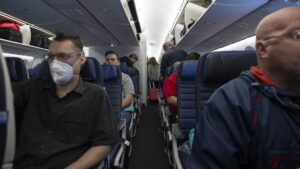Rising Concerns Over Airline Fees: A Legislative Oversight
In recent developments, the Senate Permanent Subcommittee on Investigations has taken a strong stance against the increasing fees imposed by U.S. airlines, especially those associated with selecting seats during flights. This scrutiny comes as American consumers voice their frustration over what many characterize as "junk fees" in the airline industry.
A Closer Look at the Numbers
From 2018 to 2023, major U.S. airlines—including American Airlines, Delta, United, Spirit, and Frontier—reaped an astonishing $12.4 billion from seating fees. This revenue encompasses additional charges for preferred seating options, including those with extra legroom, window or aisle seats, and closer proximity to the front of the aircraft. As passenger demand soars, airlines have leveraged this trend to increase profit margins by offering a plethora of premium seating choices and other ancillary services.
The Shift in Airline Practices
Interestingly, while several airlines have eliminated ticket-change fees for standard economy tickets, they have simultaneously escalated fees for selecting popular or more spacious seating. This shift has been accompanied by a concerted effort from airlines to expand their premium seat offerings as a means to enhance revenue stream. By paying for access to more desirable seating options, travelers may unwittingly contribute to the soaring profits of major carriers.
Legislative Action on Airline Fees
The Biden administration has made it clear that addressing the issue of hidden fees is a priority. Senator Richard Blumenthal, the Democratic chair of the subcommittee, has called for airline executives to appear at a public hearing on December 4, titled “The Sky’s the Limit—New Revelations About Airline Fees,” to discuss this troubling trend and its implications for consumers. The question remains: Are these fees reflective of the true costs of air travel, or are they simply an avenue for airlines to bolster their earnings at the expense of passengers?
A Defense from Airlines
In response to the report, Airlines for America—a prominent trade group representing the largest U.S. carriers—has defended these ancillary fees, arguing that air travel has never been more affordable. They maintain that consumers are empowered with options to choose what services they want to finance. This assertion, however, stands in stark contrast to the experiences shared by countless travelers who feel that these fees are both excessive and misleading.
Criticism of Budget Airlines
The report also examined budget carriers Spirit and Frontier, which garnered criticism for spending $26 million between 2022 and 2023 on gate agents dedicated to enforcing baggage policies. These agents were accused of pressuring passengers into paying additional fees or potentially missing their flights altogether. Spirit Airlines defended its practices, stating that it aims for transparency in its pricing and adherence to regulations. Frontier Airlines has yet to comment publicly on the report’s findings.
Understanding the Bigger Picture
As consumers increasingly voice their concerns about added financial burdens, it raises the pivotal question: How sustainable is this fee-driven model for airlines in the long run? Travelers today are more informed than ever, seeking transparent pricing and value for their hard-earned money. In this dynamic landscape, airlines could benefit from reevaluating their pricing strategies to foster brand loyalty and customer satisfaction.
At Extreme Investor Network, we believe that staying informed about these industry trends not only empowers consumers but also aids investors in understanding how airline policies can impact stock performance. As the industry navigates through regulatory pressures and changing consumer sentiments, opportunities may arise for strategic investments in airlines that prioritize customer experience alongside shareholder value.
Conclusion
The dialogue surrounding airline fees is far from over, and with legislative bodies getting involved, we can expect continued scrutiny and potential reforms. For savvy investors and mindful consumers alike, keeping tabs on these developments is crucial. Stay tuned to Extreme Investor Network for your insider insights as we dissect the evolving landscape of the airline industry, helping you make informed decisions in your investment journey.

